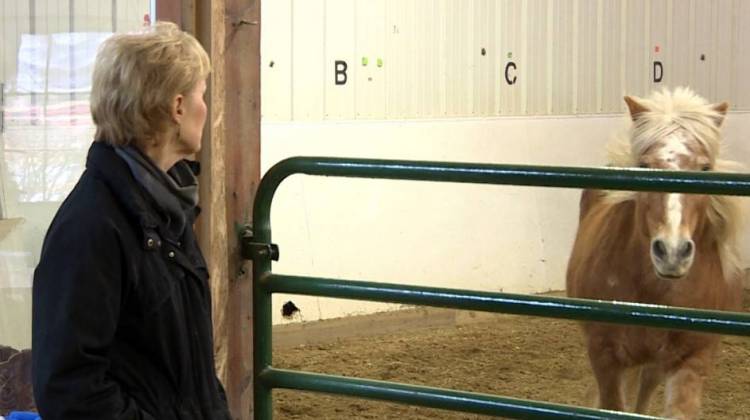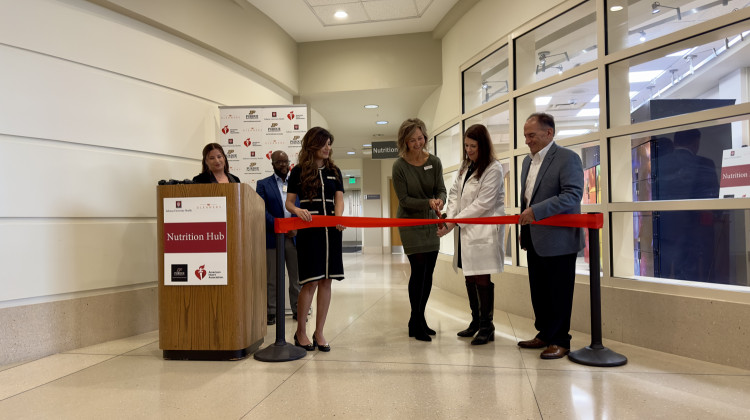
Program director at Agape Therapeutic Riding, Linda Hazard, watches as men in the group participate in a training activity with the horses called lunging.
Jill Sheridan/IPBA group of men from a recovery house in Indianapolis are benefitting from a type of addiction therapy they’ve never tried before.
There are 11 therapy horses currently helping people at Agape Therapeutic Riding center in rural north central Indiana. The therapeutic benefits or working with animals is well documented in helping reduce stress, but working with horses is different. Equine-assisted therapy for addiction addresses skill development like improving communication, patience, self-confidence and assertiveness.
Agape program director Linda Hazard says for someone in recovery the work starts with stepping out of their comfort zone and taking first steps.
“You’re not going to change behavior overnight but what you’re going to change is to have them start thinking,” says Hazard. “How can I go about this in a little different manner, because that’s how you’re going to stay in recovery.”

Progress House in Indianapolis has been helping people in recovery for the past 50 years. Dennis Norris recently took over as executive director. He is also an Afghanistan war veteran. When he came home, he worked with horses.
“I was just an angry jerk, and if you’re an angry jerk with a 1,500 pound animal you’re going to have a really bad day. And I learned that very quickly,” says Norris. “So I learned to calm myself down, to trust myself. We all did it together.”
Norris immediately thought this type of program could help some of the residents at Progress House so he reached out to Agape and Hazard to see if they could start with 10 men.
“And she said that’s fine but we want 10 of your worst guys,” says Norris. “And I said ‘OK, but don’t be surprised if you get different guys every week because they’ll drop out.”
But that’s not what happened – all the original men are still with the program. Progress House program manager Rich Stover has been on the staff for three years after being a resident. He was arrested in 2012.
“I was a big time user,” remembers Stover. “I was caught with an amount of drugs they considered a dealing amount, but I considered a daily usage.”
He struck a plea deal and finished a drug recovery program at Progress House. He says his recovery was successful with the help of the people around him.
“The staff and the structure, and the men I lived here with. The unwritten asset here at Progress house is the residents,” says Stover.
The lesson is for this group of men -- on week seven of the 16-week program at Agape -- is teamwork. In the ring, the men are working with Duke and Smarty who have free reign. There’s no riding with this type of therapy. Instead, the men are given a task based on the skill they’re trying to develop. This week, Hazard has tasked them to move chosen objects, themselves and the horses from one side of the ring to the other without getting washed away in an imaginary river.
Bill Williamson is at Progress House for the third time and says this time working with the horses has really helped him.
“I’ve learned how to open up a lot more and the ability to use resources that we never thought we had and they’re right there in front of us the whole time,” Williamson says.
Resources like family, friends, therapy and support groups. Hazard says it can be eye-opening.
“It makes them sit back and think why am I doing certain things and what is the payback for not showing up and not taking risks,” says Hazard. “Because really once you answer those questions you can’t stay with your addiction.”
Progress House is hoping to find funding to establish the program on a long term basis.
 DONATE
DONATE






 View More Programs
View More Programs

 Support WFYI. We can't do it without you.
Support WFYI. We can't do it without you.